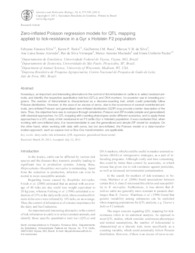Zero-inflated Poisson regression models for QTL mapping applied to tick-resistance in a Gyr x Holstein F2 population.
Zero-inflated Poisson regression models for QTL mapping applied to tick-resistance in a Gyr x Holstein F2 population.
Author(s): SILVA, F. F.; TUNIN, K. P.; ROSA, G. J. M.; SILVA, M. V. G. B.; AZEVEDO, A. L. S.; VERNEQUE, R. da S.; MACHADO, M. A.; PACKER, I. U.
Summary: Nowadays, an important and interesting alternative in the control of tick-infestation in cattle is to select resistant animals, and identify the respective quantitative trait loci (QTLs) and DNA markers, for posterior use in breeding programs. The number of ticks/animal is characterized as a discrete-counting trait, which could potentially follow Poisson distribution. However, in the case of an excess of zeros, due to the occurrence of several noninfected animals, zero-inflated Poisson and generalized zero-inflated distribution (GZIP) may provide a better description of the data. Thus, the objective here was to compare through simulation, Poisson and ZIP models (simple and generalized) with classical approaches, for QTL mapping with counting phenotypes under different scenarios, and to apply these approaches to a QTL study of tick resistance in an F2 cattle (Gyr x Holstein) population. It was concluded that, when working with zero-inflated data, it is recommendable to use the generalized and simple ZIP model for analysis. On the other hand, when working with data with zeros, but not zero-inflated, the Poisson model or a data-transformation-approach, such as square-root or Box-Cox transformation, are applicable.
Publication year: 2011
Types of publication: Journal article
Unit: Embrapa Dairy Cattle
Observation
Some of Embrapa's publications are published as ePub files. To read them, use or download one of the following free software options to your computer or mobile device. Android: Google Play Books; IOS: iBooks; Windows and Linux: Calibre.
Access other publications
Access the Agricultural Research Database (BDPA) to consult Embrapa's full library collection and records.
Visit Embrapa Bookstore to purchase books and other publications sold by Embrapa.

